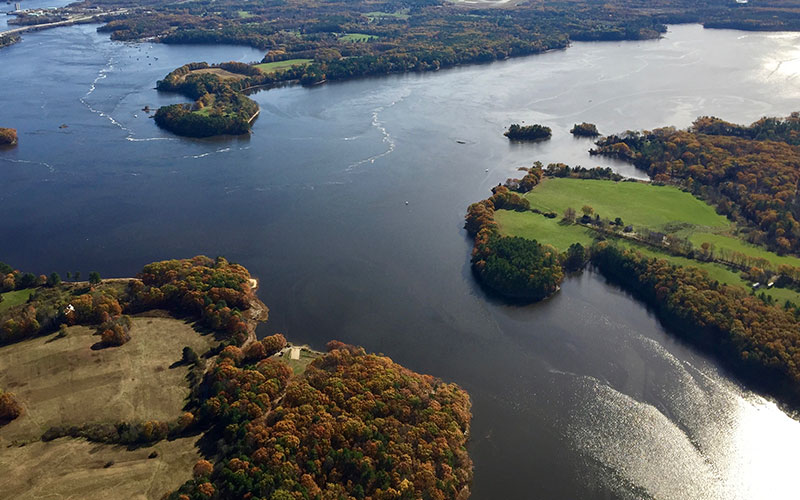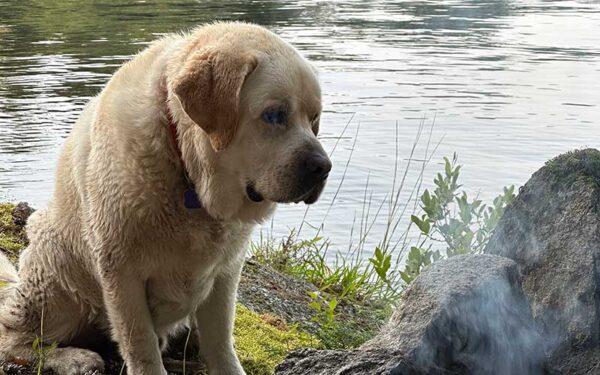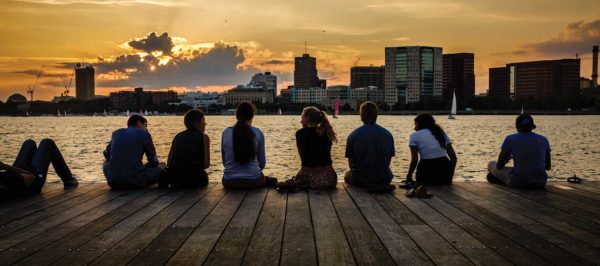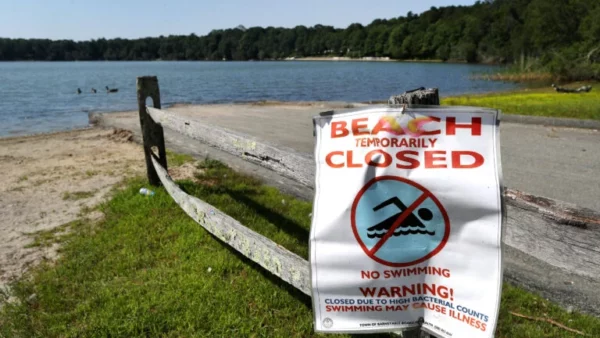
Four Exeter activists, who call themselves the "Water Women," worked to establish the Sustainability Advisory Committee after a trip on the Great Bay-Piscataqua Waterkeeper boat. Photo: Melissa Paly
Sometimes things don’t go as planned but end up exceeding all expectations. That was certainly the case with a group of Exeter activists who turned a trip on the Great Bay-Piscataqua Waterkeeper boat into a town-wide call to better protect water resources, conserve energy, and be a more sustainable community.
On a blustery, cool day last October, I took four women from Exeter out for a boat tour of the Great Bay. They served on different local boards and committees but didn’t know each other well. In cities and towns across the Great Bay, this sort of siloing happens among local boards and in city government. It can make getting everyone working together for a clean, sustainable estuary challenging.
But after the boat ride last fall, these four women, who dubbed themselves the Water Women, were motivated to change that. Their hard work paid off last week when the Sustainability Advisory Committee they advocated for met for the first time. Two of the Water Women, Jenn Brackett Piskovitz and Robin Tyner, are now members of the new committee.
Experiencing the estuary from the Waterkeeper boat sparked that process.
Seeing the Estuary Firsthand
Before the boat ride last fall, most of the group had never been out on Great Bay. It’s a convoluted tangle where the fresh water from seven rivers – draining through 52 communities in the two states of Maine and New Hampshire – meet the sea.
Motoring along the shores of Newington and Dover, I talked about the declining health of Great Bay and the loss of more than half of the underwater seagrass meadows that used to carpet the estuary. These meadows produce oxygen, provide rich habitat for critters, and hold sediment in place against the whipping winds and tides so famous in the Piscataqua River. I also talked about the loss of another important species in the estuary: the delicious and effective water-filtering oysters.
Without these two cornerstones, this estuary – like many others – is really out of whack. The decline is mostly related to the growth in population in the Seacoast region over the past few decades and the many changes that accompany more people: more sewage and septic systems, more roads and parking lots, more lawns and chemicals and fertilizers. This all runs into streams, rivers, and ultimately, right into the Bay.
What Happens in Exeter Impacts Great Bay
On the boat, we also talked about Exeter specifically, like the town’s new and improved sewage treatment plant. Sewage and septic systems cause nitrogen pollution, one of the greatest threats to the ecosystem. The new plant will dramatically reduce the pollution, but sewage facilities are only a fraction of the problem. Much of the pollution washes off all the paved, built landscapes that have replaced forests and fields.
There’s room for Exeter to improve its rules about development and stormwater runoff management. As the women shared their ideas out on the water, they became collectively inspired to see what more they could do in their community to fight for the health of Great Bay.
They left the boat tour wanting to better understand what happens to their river and how decisions made in their town could help – or hurt – the system as a whole.
Experiences on the Water Lead to Action on Land
Through the fall and into the winter, the Water Women dug into the rules and regulations in Exeter to see what more could be done. They read reports about ways to better manage stormwater and prevent pollution from new development. They met with town staff in different departments and to better understand the work already happening in Exeter.
They realized that the town needed a dedicated Sustainability Coordinator who, like a conductor of the orchestra, could steer the community toward greater environmental health. It’s not just Exeter – many cities and towns in Great Bay could use a point person to coordinate programs, work across departments, and make information easily accessible.
The Water Women drafted a warrant article for a town Sustainability Coordinator for the March town meeting. They got signatures, wrote letters to the editor, made presentations to the Select Board, organized an environmental film festival, had panel discussions, made signs, worked social media. They poured energy, passion and determination into this vision of a healthier Exeter and Estuary, and the warrant passed handily.
Now, the new Sustainability Advisory Committee is looking at how the town can better steward water resources, reduce energy use, and establish a formal Sustainability Office for Exeter.
Out on the water, it’s clear that our beloved Great Bay is in jeopardy and that the time to act is now. As I continue to take people out on the water this summer, I hope they too feel empowered to make change back on land.




